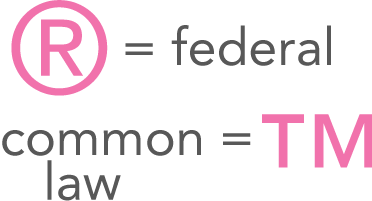In my previous post about domain names, we talked a little about your "trademark" and how it might relate to obtaining a domain name.
So what is a trademark?
- A trademark is a word, phrase, symbol or design, or a combination of words, phrases, symbols or designs, that identifies and distinguishes the source of the goods of one party from those of others.
- A service mark is the same as a trademark, except that it identifies and distinguishes the source of a service rather than a product. The term “trademark” is often used to refer to both trademarks and service marks.
You might ask...as an artist, should I have to formally register my trademark with the USPTO (US Patent and Trademark Office)?
“No. You can establish rights in a mark based on use of the mark in commerce, without a registration. However, owning a federal trademark registration on the Principal Register provides several important benefits.”
Then what's the advantage of registering your trademark with the USPTO? There are a few, but the extent to which it's beneficial to you depends on your business. If you decided that your goal is to develop a line of production jewelry that you market to large department stores, then a federal trademark might be in order. Are you going to market internationally? And probably equally important, do you have the money to defend your trademark if something happens? Then maybe you might want to register your trademark.
Do you as an artist need to do this? Probably not. But just for curiosity's sake...
Google ads for trademark filing
how much does it cost?
I did a search on Google to find out how much it costs to register a trademark. Talk about confusing! There is a fee schedule on the USPTO website that lists a variety of different trademark and patent options. At first glance, I saw a "$45" price for a "micro-entity." That sounds like me! Nope, that's for a patent, not a trademark. Looking further, I saw a sidebar on Google advertising a $69 Trademark Filing! Sweet! That's not too bad.
But there's a catch. That's the fee to the company that files it FOR you. Looking further, there is an additional $325 cost for the USPTO trademark filing. You can do it yourself, and it looks like the electronic filing fee is as low as $275. These companies are using the most expensive price—the price to file a traditional paper form—then tacking on another fee.
But the question remains. Do you NEED to file a trademark? Not necessarily. So what else can you do to protect your brand?
My trademark listed on the Colorado Secretary of State website
filing at the state level
You can check with the Secretary of State of your state, or just do a Google search on "filing trademark (insert state name here)." Click here for the example search from Colorado. In general, the state says that you're not supposed to trademark a business name, " except when the name is used for advertising or placed on goods, i.e., when the name of the entity is used to describe the source of goods or services."
So I registered my trademark. I think it cost about $30. I use the trademark on my website, in my advertising, and on my packaging for my jewelry. Plus it's kinda fun to tell your friends, "please refer to me as 'Kat Kramer, (TM)'!"
What's the advantage? On the small scale, not much. But it establishes your BRAND which can be helpful later. For example, if you tried to register a domain name that was being cybersquatted on, it's one more piece of official proof that you have done business under that name.
what about a "common law trademark?"
If you've been producing work under your name, you already have a "common law trademark" that IS valid for establishing intellectual property rights.
“U.S. Trademark Law is mainly governed by the Lanham Act. “Common Law” trademark rights are acquired automatically when a business uses a name or logo in commerce, and are enforceable in state courts. Marks registered with the U.S. Patent and Trademark Office are given a higher degree of protection in federal courts than unregistered marks - both registered and unregistered trademarks are granted some degree of federal protection under the Lanham Act 43(a).””
If you're using a common law trademark, you'll use the "(TM)" on your marketing materials. If you have filed a federal trademark application, you'll use "(R)".
But as an artist, the TM will most likely work fine. If you're really concerned about it, consult an attorney.


